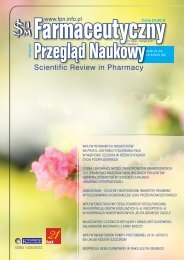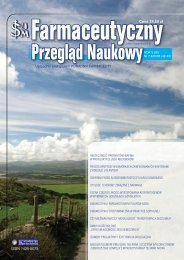Pokaż caÅy numer - FPN - Farmaceutyczny PrzeglÄ d Naukowy
Pokaż caÅy numer - FPN - Farmaceutyczny PrzeglÄ d Naukowy
Pokaż caÅy numer - FPN - Farmaceutyczny PrzeglÄ d Naukowy
You also want an ePaper? Increase the reach of your titles
YUMPU automatically turns print PDFs into web optimized ePapers that Google loves.
Farm Przegl Nauk, 2010,7, 10-14Risk factors of adverse cardiac eventsin patients with chronic systolic heart failureCzynniki ryzyka niekorzystnych zdarzeń sercowychu chorych z przewlekłą skurczową niewydolnością sercaAleksander Owczarek 1 , Bożena Szyguła-Jurkiewicz 2 , Krzysztof Helewski 3 ,Karolina Klimaszewska 4 , Romuald Wojnicz 31Division of Statistics in Sosnowiec, Medical University of Silesia, Katowice, Poland2III Department of Cardiology in Zabrze, Medical University of Silesia, Katowice, Poland3Department of Histology & Cardiology in Zabrze, Medical University of Silesia, Katowice, Poland4Student Scientific Society, III Department of Cardiology in Zabrze, Medical University of Silesia, Katowice, PolandAbstractChronic heart failure (HF) is an arising important medicalproblem. Apart from neuroendocrine system activation,it is also characterized by an inflammatory component.Pro-inflammatory cytokines exacerbate haemodynamicabnormalities, exert direct toxic effects on the heart andcontribute to cachexia. A prospective study has been accomplishedin the group of 164 patients with stable systolicheart failure in order to investigate the association betweenhypercoagulability, inflammation, NT-pro BNP and theclinical outcome. Major adverse cardiac event (MACE)experienced 43.3% of patients. Independent inflammatoryrelatedrisk factors of MACE in patients with HF are plasmalevels of: high sensitivity C-reactive protein, fibrinogen,D-dimers and NT-pro BNP.Key words: high sensitivity C-reactive protein, heart failure,risk factors, MACEStreszczeniePrzewlekła niewydolność serca (HF) stanowi istotny problemmedyczny. Oprócz aktywacji układu współczulnego,niewydolność serca charakteryzuje się również zwiększonąaktywnością układu odpornościowego. Krążące wekrwi cytokiny prozapalne nasilają zaburzenia hemodynamiczne,wywierają bezpośredni toksyczny wpływ na sercei wtórnie przyczyniają się do wyniszczenia organizmupacjenta. W celu oceny związku między czynnikami odzwierciedlającymiaktywność układu immunologicznego,krzepnięcia oraz NT-pro BNP a rokowaniem odległym,przeprowadzono badanie prospektywne w grupie 164pacjentów ze stabilną skurczową niewydolnością serca.U 43.3% pacjentów wystąpiło niekorzystne zdarzeniesercowe (MACE). Niezależnymi czynnikami związanymize zwiększonym ryzykiem wystąpienia MACEu tych chorych okazały się stężenia w surowicy: białkaC-reaktywnego wysokiej czułości, fibrynogenu,D-dimerów i NT-pro BNP.Słowa kluczowe: białko C-reaktywne wysokiej czułości,niewydolność serca, czynniki ryzyka, niekorzystne zdarzeniesercowo-naczyniowe (MACE)IntroductionCardiovascular diseases are the leading cause of morbidity,disability and premature mortality in developedcountries. Chronic heart failure (HF) is an arising importantmedical problem. It accounts for at least 5% of admissionsto general medical and geriatric wards and for almost 2% ofthe total healthcare expenditure (dependent on the country)[1]. It has been estimated that only in Europe HF affects 10million people [2]. Most common causes of HF are: coronaryartery disease leading to myocardial infarction (systolicdysfunction), hypertension and valvular heart disease, infections,‘idiopathic’ dilated and alcoholic cardiomyopathy[3].Heart failure is a clinical syndrome resulting from astructural and functional cardiac disorder. It impairs the abilityof the ventricle to fill with or eject blood according tothe needs of the body, or precludes it from doing so in theabsence of increased filling pressures. It is a multisystemdisorder which is characterized by abnormalities of cardiac,skeletal muscles as well as renal function, stimulation ofthe sympathetic nervous system and a complex pattern ofneurohormonal changes [4]. Figure 1 presents the overviewof main pathophysiology pathways in HF. As heart failureadvances there is a relative decline in the counter regulatoryeffects of endogenous vasodilators such as: nitric oxide,prostaglandin, bradykinin, atrial and brain natriureticpeptides (ANP, BNP). Other factors that play a role in thepathogenesis of HF include: the endothelin and adenosinereceptor systems, vasopressin, pro-inflammatory cytokines10
















